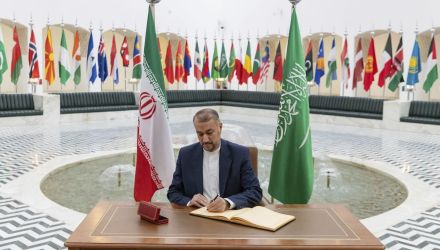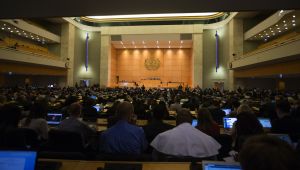Recently, the Senate voted in support of the Bush administration's request for funds to explore new nuclear 'bunker-buster' technology. In his major national security address in June, John Kerry specifically criticized this drive to expand our nuclear arsenal. This is but one of many significant differences between the two candidates on what Kerry called 'the greatest threat we face in the world today -- a terrorist armed with nuclear weapons.'
In describing the threat, Kerry mirrored Bush's oft-repeated one-liner about preventing 'the world's most dangerous regimes and terrorists' from acquiring 'the world's most destructive weapons.' To keep 'the worst weapons from falling into the worst hands,' he outlined a strategy and program of actions.
Bush campaign spokesmen reacted sharply to Kerry's speech, as if turf owned by this president had been invaded by the challenger. Accusing Kerry of 'me-too-ism,' they argued that Bush identified this threat first, that the administration is doing everything that can be done about it and that Kerry's proposals to do much more, much faster are 'unrealistic.'
Amidst clamorous competing claims, many commentators have concluded that on nuclear terrorism Kerry is little more than Tweedle-Dum to Bush's Tweedle-Dee. However, careful comparison of the positions advocated by Kerry and Bush on how to prevent nuclear terrorism reveals a wide gulf between them. Consider three issues: urgency, strategy and personal priority.
For Kerry, nuclear terrorism is 'our most urgent priority.' Operationally, 'most urgent' requires maximum effort to do everything possible on the fastest technically feasible timetable. Kerry therefore proposes securing all vulnerable nuclear weapons and materials in Russia, as well as nuclear materials at risky research reactors in other countries, within the first four years of a Kerry presidency.
This contrasts sharply with the Bush plan, which, like Clinton's, focuses on activity not tempo. At the current pace, the finish line when all potential nuclear weapons will be secure from theft lies more than a decade ahead. Bush accepts this result with equanimity, rather than adamantly pushing for an earlier deadline. In fact, under Bush, fewer 'near nukes' (lumps of highly enriched uranium and plutonium from which a terrorist could make a nuclear weapon) in Russia have been secured in the two years after 9/11 than in the two years prior to 9/11. At this rate, it will take until 2017 to complete that job.
'No more material'
Strategically, the Bush program focuses on offense against would-be nuclear terrorists, but gives defense short shrift. In responding to Kerry's speech, Bush surrogate Sen. Saxby Chambliss argued that defense is essentially 'too hard.' According to Chambliss: 'As long as you have terrorists out there, there are going to be weapons that are available to those terrorists. The No. 1 goal, frankly, is to eliminate the terrorists. Weapons of mass destruction mean nothing without terrorists.'
Conversely, Kerry calls for a balanced strategy that accelerates offense and deepens defense. Proposing expanded efforts to capture and kill terrorists wherever they are, he notes, nonetheless, that offense alone will not suffice. If preventing nuclear terrorism is the problem, securing nuclear weapons and materials is the simplest answer. In his words: 'No more material; no bomb; no nuclear terrorism.'
Hand-to-hand combat
To achieve this result, Kerry recognizes the necessity for deep international cooperation. While the Bush administration has created a G8 Global Partnership and launched the Proliferation Security Initiative, its unilateralist instincts have exasperated essential allies. Despite the fact that the administration has engaged in six-party talks on North Korea's methodical march toward a nuclear arsenal, its nonnegotiable 'no carrots, no sticks' approach has led the governments of both China and South Korea to conclude that the U.S. posture is as unrealistic as the North Koreans'.
Finally, preventing nuclear terrorism requires not just rhetoric but hand-to-hand combat by a commander-in-chief who makes it a priority for himself, personally. While talking about 'priority,' in fact, day-to-day, President Bush has been detached. As U.S.-Russian agreements and initiatives have bogged down in the bureaucracies of both governments, he has refused to resolve cabinet-level differences within his own government or to persuade Putin to do the same. And he has repeatedly rejected the recommendation urged by GOP Sen. Richard Lugar and others that he make this the full-time job of a high-level White House coordinator who reports directly to him.
Theory and practice
Kerry not only endorses the proposal for such a coordinator, but pledges to make this a daily claim on his scarce time and energy. As he argued in his speech, preventing nuclear terrorism would be as important to a Kerry presidency as preventing nuclear war was to Cold War presidents such as John F. Kennedy and Ronald Reagan.
Yogi Berra once observed: 'In theory there is no difference between theory and practice. In practice there is.' While Bush and Kerry agree in theory, in practice, Bush has struck out on this issue. Kerry is eager to show that he can hit this ball.
Graham Allison is director of the Belfer Centerfor Science and International Affairs at Harvard's Kennedy School of Government. His next book,Nuclear Terrorism: The Ultimate Preventable Catastrophe, will appear in August.
Allison, Graham. “Policies on Nukes Reveal Wide Gulf.” Miami Herald, June 27, 2004




